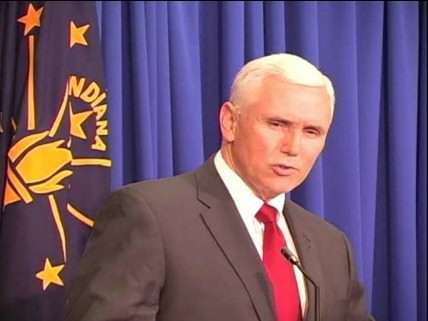Mike Pence: Our Religious Freedom Law Ain't Broke, But We'll Fix It
Indiana's governor calls for a RFRA amendment clarifying that the law does not authorize anti-gay discrimination.

This morning Indiana Gov. Mike Pence, reeling from nationwide criticism of his state's newly minted Religious Freedom Restoration Act (RFRA), promised "legislation that makes it clear that this law does not give businesses the right to deny services to anyone." Pence did not specify what language would accomplish that goal, but he said he has been consulting with legislative leaders and is determined to sign a corrective bill this week. "This law does not give anyone a license to deny services to gay and lesbian couples," he said, answering a question that he repeatedly dodged in an ABC News interview on Sunday. Yet Pence continued to obfuscate the issue of whether the law can be used as a defense against discrimination complaints.
According to Pence, an amendment is needed not to change the substance of Indiana's law but to address "misunderstanding and confusion and mischaracterization" casting it as a vehicle of anti-gay bigotry. "I was pleased to have signed it, and I stand by the law," he said. "I don't believe for a minute that it was the intention of the General Assembly to [create] a right to deny services to gays, lesbians, or anyone else, and it certainly wasn't my intent. But I can appreciate that that's become the perception, not just here in Indiana but all across this country, and we need to confront that…The Religious Freedom Restoration Act is not about discrimination. As I said last week, had this law been about legalizing discrimination, I would have vetoed it. This law does not give anyone a license to discriminate….It is simply a balancing test used by the federal courts and jurisdictions across the country for more than two decades."
That much is true, but Indiana's RFRA does give bakers, florists, photographers, and anyone else who refuses to participate in a gay wedding a possible defense against complaints brought under local antidiscrimination ordinances. Under RFRA, they can argue that forcing them to assist gay couples "substantially burdens" their "exercise of religion." If a court accepts that claim, the burden is then on the government to justify the imposition by showing it is "the least restrictive means" of serving a "compelling governmental interest."
Social conservatives who supported Indiana's RFRA clearly hoped the government would not be able to satisfy that test. But University of Virginia law professor Douglas Laycock, an expert on religious liberty who supports gay marriage but is sympathetic to the claims of conscientious objectors who do not want to facilitate it, notes that "nobody has ever won a religious exemption from a discrimination law under a RFRA standard." Laycock hopes that people who run "very small businesses providing wedding services or marital counseling services" can use laws like Indiana's to avoid being conscripted into work that violates their religious beliefs. But he says he is "not optimistic," noting that "so far, the religious claimants have lost all of those cases."
RFRA's impact on such cases is currently relevant only in Indianapolis, Bloomington, and South Bend, which prohibit discrimination based on sexual orientation. State law does not, so the "license to discriminate" that worries RFRA opponents already exists in most of Indiana. Today Pence reiterated his opposition to banning discrimination based on sexual orientation, saying, "I've never supported that. It's not on my agenda."
Furthermore, even while insisting that RFRA has nothing to do with discrimination, Pence hinted in the ABC News interview that he is sympathetic to the religious freedom claims of people who balk at baking gay wedding cakes or photographing gay weddings:
The issue here is, you know, is tolerance a two-way street or not? I mean, you know, there's a lot of talk about tolerance in this country today, having to do with people on the left. And but here, Indiana steps forward to protect the constitutional rights and privileges of freedom of religion for people of faith and families of faith in our state.
"When you say tolerance is a two-way street," ABC's George Stephanopoulos asked, "does that mean that Christians who want to refuse service, or people of any other faith who want to refuse service to gays and lesbians, that it's now legal in the state of Indiana? That's a simple yes or no question." It was a question Pence persistently refused to answer, to the point that the interview is uncomfortable to watch.
To be clear: There is nothing wrong with thinking that people should not be forced to do work they do not want to do, whatever their motivation might be. But rather than forthrightly defend that principle (or a more limited version of it, based specifically on religious freedom), Pence has repeatedly assured us that Hoosiers are nice people. Today he declared them "the greatest people on Earth" and regretted that their reputation for hospitality had been sullied by the RFRA controversy. "I abhor discrimination," he said. "I believe that no one should be harassed or mistreated because of who they are, who they love, or what they believe, and I believe every Hoosier shares that conviction." I do not know whether the legislative fix Pence has in mind will assuage his critics, but I hope it does, if only so he will stop going on and on about Hoosier hospitality.


Show Comments (183)